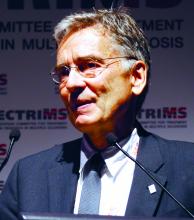STOCKHOLM – according to research presented at ECTRIMS 2019. Ponesimod also reduces fatigue and the number of active lesions, compared with teriflunomide.
Ponesimod selectively modulates the sphingosine-1-phosphate receptor 1 (S1P1). The drug is administered orally and reduces circulating lymphocyte counts by inducing a rapid, dose-dependent, and reversible sequestration of lymphocytes in lymphoid organs. This effect decreases the number of immune cells available for inflammatory attacks in the CNS, said Ludwig Kappos, MD, head of the department of neurology at University Hospital Basel (Switzerland). The drug has no active metabolites, and its effects on the immune system are reversible.
Dr. Kappos and colleagues conducted the OPTIMUM phase 3 study to assess the efficacy and safety of oral ponesimod, compared with those of teriflunomide. They enrolled patients between ages 18 and 55 years with an established diagnosis of MS according to the 2010 McDonald criteria with a relapsing course from onset into the multicenter, randomized, double-blind, superiority study. Eligible patients had an Expanded Disability Status Scale (EDSS) score of 0 to 5.5 inclusive and recent clinical or MRI disease activity. Dr. Kappos and colleagues randomized participants in equal groups to receive ponesimod (20 mg/day) or teriflunomide (14 mg/day) and the respective placebo for 108 weeks. To mitigate the potential effects on heart rate that are associated with S1P1 modulators, patients were titrated gradually from 2 mg/day to the target dose over 14 days.
The trial’s primary endpoint was the annualized relapse rate over 108 weeks. Secondary endpoints were the effect on fatigue-related symptoms, as assessed with Fatigue Symptom and Impact Questionnaire-Relapsing MS (FSIQ-RMS); active lesions on MRI to week 108; and time to 12- and 24-week confirmed disability accumulation to end of study. The investigators also assessed the drugs’ safety and tolerability.
Dr. Kappos and colleagues randomized 1,133 patients at 162 sites in 28 countries. They stratified randomization according to whether participants had received prior disease-modifying treatment in the previous 2 years (39.4% had, and 60.6% had not) and EDSS score at baseline (83.4% had a score of 3.5 or lower, and 16.6% had a score above 3.5). The population’s mean age was 36.7 years, and 65% of participants were female. Most patients were recruited in Europe, and 51% came from E.U. countries. Patients’ mean baseline EDSS score was 2.6, and mean disease duration was 7.6 years. The mean prestudy 12-month relapse rate was 1.3, and 483 (42.7%) patients had one or more gadolinium-enhancing T1 lesions on baseline MRI. The two treatment groups were well balanced. The rate of treatment discontinuation was 16.6% for ponesimod and 16.4% on teriflunomide.
At the end of the study, the annualized relapse rate was 0.202 in the ponesimod group and 0.290 in the teriflunomide group. Compared with teriflunomide, ponesimod significantly reduced the annualized relapse rate by 30.5%. Fatigue remained stable in the ponesimod group, but worsened in the teriflunomide group: The mean difference in FSIQ-RMS score between the arms at week 108 was 3.57, and this result was statistically significant. In addition, ponesimod significantly reduced the number of active lesions by 56%, compared with teriflunomide. The risk for 12- and 24- week confirmed disability were lower with ponesimod, compared with teriflunomide, but the difference was not statistically significant.
The rates of treatment-emergent adverse events were approximately 89% for the ponesimod arm and 88% for teriflunomide. The rates of serious adverse events were about 9% for ponesimod and about 8% for teriflunomide. Respiratory events and laboratory values prompted slightly more study discontinuations in the ponesimod group than in the teriflunomide group.
This research represents the first controlled study to show superior efficacy of oral ponesimod, compared with an approved oral compound, said Dr. Kappos. “The overall profile suggests that [ponesimod] may be a valuable addition to our armamentarium in treating patients with relapsing forms of MS,” he concluded.
The study was supported by Actelion Pharmaceuticals. University Hospital Basel, where Dr. Kappos works, received steering committee, advisory board, and consultancy fees from Actelion and other companies.
SOURCE: Kappos L et al. ECTRIMS 2019, Abstract 93.


